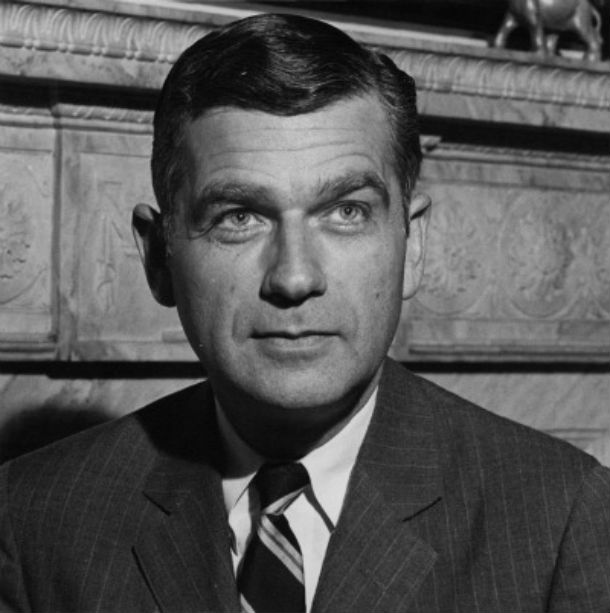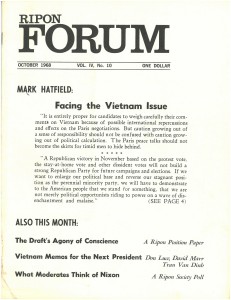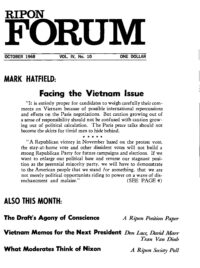 MARK HATFIELD
MARK HATFIELD
Negotiators have been meeting for nearly four months in Paris and while they have been holding their cordial, weekly meetings and coffee breaks, 5000 Americans have died and another 34,000 young men have been wounded. No one knows how many thousands of South Vietnamese have been made homeless or how many have been killed and maimed. Yet, despite the growing casualty figures and the lack of progress in Paris, the American public is mesmerized and mute: political candidates at all level~ and of both national parties have declined to speak out on the relevant issues of Vietnam.
It may be that I – and other critics of our Vietnam policies -are to a degree responsible for the hypnotized state of American public opinion which allows political candidates to successfully avoid confronting the issue. For many months we repeatedly emphasized the need to establish negotiations. And perhaps in stressing the necessity for peace talks, we did not state clearly enough that negotiations were not an end in themselves. Now many people feel obligated to remain silent, and allow office-seekers the luxury of silence; because the President has given us peace talks, he has ostensibly met our demands. The point is, however, that negotiations themselves are not the objective: peace is the objective. The establishment of discussions in Paris represents no more than a first step in moving from a military to a political resolution of the war.
It is past time for the American people to begin demanding that the political parties and candidates who seek to govern face up to the issue of peace and display the political courage to match their political ambition.
In 1964 the American people- trusting the campaign promises of the Democratic presidential candidate – thought they were voting for peace, only to have their trust betrayed. Candidates at all levels are again expecting voters to accept their post-election intentions on faith and they deal with Vietnam in terms of assurances not to “sell out” our men in Vietnam and vague promises for “an honorable peace.” This is not enough. In the democratic process voters should not be forced to go to the polls with their fingers crossed : they should not be forced to rely on blind faith that the man they vote for will share their views on the most important issue of the election.
I am not suggesting that political candidates are obligated to present blueprints for our extrication from Vietnam; but I am suggesting that those people who want to be a part of the political leadership of this country during the coming years have an obligation to American voters to address themselves to the relevant issues of Vietnam.
It is entirely proper for candidates to weigh carefully their comments on Vietnam because of possible international repercussions and effects on the Paris negotiations. But caution growing out of a sense of responsibility should not be confused with caution growing out of political calculation. The Paris peace talks should not become the skirts for timid men to hide behind.
LEGITIMATE QUESTIONS
There are many legitimate questions concerning Vietnam that can be put to candidates. What is their position on the bombing of North Vietnam? How would they define the goals of the negotiations in Paris? Do they favor continued search-and-destroy operations in the South? Would they consider a unilateral cease-fire? Should the Vietcong be represented at the conference table when substantive peace talks start? What would they do to help the South Vietnamese government win the allegiance of its people? How would they involve the United Nations in the settlement of the war? Would they accept Vietcong participation in a representative South Vietnamese government? What vital interests does the United States have at stake in Vietnam and are these worth the price demanded of us and of the Vietnamese? What should be US policy – both economically and militarily – toward Southeast Asia after the Vietnam conflict is settled? What should be the US role in the reconstruction of this country?
If we want to enlarge our political base and reverse our stagnant position as the perennial minority party, we will have to demonstrate to the American people that we stand for something, that we are not merely political opportunists riding to power on a wave of disenchantment and malaise.
Many candidates talk in terms of the substitution of South Vietnamese troops for American forces. Others insist that the South Vietnamese government put a halt to corruption and make the long needed economic, political and social reforms. No one would quarrel with these goals and while they make fine campaign slogans, they miss the point. The question to put before candidates is: “how are you going to accomplish these goals?” What possible ways do you see to force the South Vietnamese to assume responsibility for the war and to make the reforms that should have been made 15 years ago? And what alternatives would you consider if the South Vietnamese government refuses or is incapable of taking over the war or restructuring its social, political and economic institutions?
BUILDING THE GOP
Although Vietnam is an issue transcending party lines, let me be partisan for just a moment. A year ago, in the fall of 1967, I began speaking to Republican groups and detailing for them my conviction that the GOP must disassociate itself from the Vietnam policies of the present Administration. I remain convinced that this is not only the wisest course in terms of political advantages in November but it is the necessary course in terms of building a strong Republican Party.
 I don’t believe we should underestimate the agility of Democratic candidates. There is no question but that many Democratic office-seekers will disassociate themselves from President Johnson’s Vietnam policies and leave Republicans standing in the public spotlight as “supporters” of the Administration. This could be disastrous. The primaries and polls have demonstrated that millions of Americans disagree with the Johnson Administration’s policies, but Republicans have not yet convincingly demonstrated that they offer any alternative. Democratic candidates were to pre-empt this role they very probably would win support from the anti-war Republicans and the millions of McCarthy, Kennedy and McGovern backers.
I don’t believe we should underestimate the agility of Democratic candidates. There is no question but that many Democratic office-seekers will disassociate themselves from President Johnson’s Vietnam policies and leave Republicans standing in the public spotlight as “supporters” of the Administration. This could be disastrous. The primaries and polls have demonstrated that millions of Americans disagree with the Johnson Administration’s policies, but Republicans have not yet convincingly demonstrated that they offer any alternative. Democratic candidates were to pre-empt this role they very probably would win support from the anti-war Republicans and the millions of McCarthy, Kennedy and McGovern backers.
A Republican victory in November based on the protest vote, the stay-at-home vote and other dissident votes will not build a strong Republican Party for future campaigns and elections. If we want to enlarge our political base and reverse our stagnant position as the perennial minority party, we will have to demonstrate to the American people that we stand for something, that we are not merely political opportunists riding to power on a wave of disenchantment and malaise. Republicans may very well win political offices by carefully refraining from taking stands on controversial issues so as to offend no one, but we will not have won any type of permanent political allegiance that will serve as a foundation for future victories.
Mark O. Hatfield serves as United States Senator from Oregon.




